Doctor Who: A Hero’s Journey
The new Doctor arrives this August. Doctor Who, the British science-fiction show, follows the adventures of a Time Lord known as The Doctor. He travels in a TARDIS (time and relative dimension in space), a time-traveling spaceship whose exterior takes the shape of a blue police box. With the help of his companion, the Doctor faces adversaries, saves planets, and helps people in need.
Initially, the show ended in 1989; however, Doctor Who, the television film, was released in 1996 in an attempt to revive the series, but the attempt was unsuccessful. After the hiatus, the show’s showrunner, Russell T. Davies, revived the show in 2005 starring Christopher Eccleston as the Doctor and Billie Piper as the Doctor’s companion, Rose Tyler. The plot reveals some indication regarding the Doctor’s involvement in the Time War, a conflict which killed the Time Lords and the Daleks. The Daleks is one of the Doctor’s adversaries and were created by a scientist named Davros from the planet of Skaro. The Daleks reappear in the series now and then, with their main objective being to “exterminate” any non-Dalek beings. Eccelston stayed only one year as the Doctor with David Tennant taking over the role as the Doctor (2005-2010). After Russell T. Davies announced he was leaving as showrunner, along with Tennant’s departure, Steven Moffat took over as the head writer and Matt Smith was named the Eleventh doctor, followed by Peter Capaldi as the Twelfth Doctor.
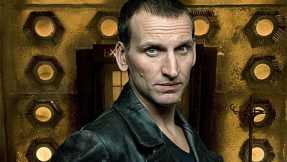
Despite the show’s replacement of the beloved Tenth Doctor and changing head writers, Doctor Who still remains a cult favorite among many fans. Although Russell T. Davies announced his departure from the successful television series, Davies accomplished brilliant story and character arcs.
While Moffat’s take on Doctor Who involves complicated story arcs and plot lines centered mostly on the idea that “everybody lives,” Davies’ influence on the show was more character-based, often showing how the death of certain characters affect and shape the Doctor.
Swiss psychiatrist Carl Jung popularized the idea of archetypes and argued that many of the archetypes’ representations were through myths and fairy tales (Jung 5). Today, archetypes can be found in literary works and television shows. Jung argued that archetypes are ingrained in the “collective unconscious,” meaning the images are universal, which allows everyone to recognize characteristics of the archetype (Jung 5). In an article published by Alex Charles, he examined Carl Jung’s archetypes in three popular figures, one of them being Doctor Who. By analyzing archetypes, they not only provide a deeper insight into the characters, but also an understanding of “the individual human psyche” (Jung).
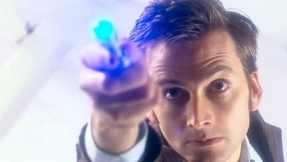
While Freud believed in examining a character’s psychological problems, Jung believed in studying character in order to better understand the character themselves (Jung). While Charles focused his analysis on all three figures, I would like to primarily focus and study Jung’s archetypes in the characters of the Ninth and Tenth Doctor in Doctor Who. Although Carl Jung studied archetypes in its impact on the collective unconscious, Joseph Campbell went a step further. By analyzing the archetype of “the hero” and “the shadow,” this discussion will provide more in-depth insight into the Doctor’s character.
Hero
One of the archetypes featured in Doctor Who is the Hero, representing the Doctor. According to Jung, he defines the archetypal hero as “a symbol which unites the opposites; a mediator, bringer of healing, that is, one who makes whole” (Jung). The hero’s nature is “human but raised to the limit of the supernatural–he is “semi-divine” (Jung). Jung symbolizes the hero fighting great odds yet with human vulnerability. This “paradox,” according to Jung, “is the essence of the hero and runs through his whole destiny like a red thread” (Jung). In the case of the Doctor, the paradox allows him to use his advance knowledge to help others. Joseph Campbell elaborated Jung’s theory by studying myths and legends from all over the world. Joseph Campbell’s The Hero with a Thousand Faces discusses the archetypal hero, asserting that the hero undergoes a transformation:
1. The Primordial Hero and the Human
2. Childhood of the Human Hero
3. The Hero as Warrior
4. The Hero as Lover
5. The Hero as Emperor and as Tyrant
6. The Hero as World Redeemer
7. The Hero as Saint
8. Departure of the Hero
I believe that the Doctor embarks on a journey and experiences a transformation. Because the new series of Doctor Who begins after the events of the Time War, audiences remain unaware of the Doctor’s upbringing. However, the Ninth Doctor’s story begins after the Time War, which reflects the hero as a warrior. Throughout the narration, the Doctor gradually reveals he brought an end to the Time War. Although Campbell argues that the hero fights a battle to transition from child to adult, in this case, the fight serves a different purpose. The Time War destroyed worlds, killed innocent lives, and brought the universe to the brink of extinction, yet the Doctor ultimately decides to bring an end to the war by committing genocide. By ending the Time War, the Doctor saves millions of lives, yet the Doctor remains traumatized by the event, thereby becoming a lone survivor.
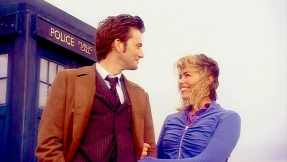
For “The Hero as Lover,” Campbell defines the hero’s love interest (or maiden) as “the image of his destiny which he is to release from the prison of enveloping circumstance” (293). Rose Tyler, one of the Doctor’s companions, serves as the Doctor’s love interest. When the Doctor and Rose meet, the Doctor has a nihilistic attitude, yet over time, she gradually has an effect on the Doctor. Her time with the Doctor helps heal the Doctor’s damaged soul. The maiden represents the “other portion” of the hero (293). If the hero represents masculine qualities, the maiden represents feminine qualities such as emotion and intuition. While Rose’s time with the Doctor allows her to become a better version of herself, she also helped the Doctor. For example in “Journey’s End,” the Doctor tells Rose that she “made [him] better.” According to Campbell, a hero encounters difficult trials in order to make himself worthy of his beloved. Although the tasks are difficult, “no task in the world is beyond his skill” (295). The hero often receives help, which often includes help from the maiden. In “Doomsday,” the Doctor and Rose are tragically separated from one another, yet in series 4 Rose finds a way to warn the Doctor about an impending doom.
“The Hero as a Emperor and as Tyrant,” Campbell describes this notion as two different outcomes. The hero becomes King and either rules with peace and harmony, or a hero becomes a tyrant. As a tyrant, the ruler is no longer “the mediator between the two worlds” but uses his power oppressively. The Doctor also shows characteristics as a tyrant in the episode “The Runaway Bride.”
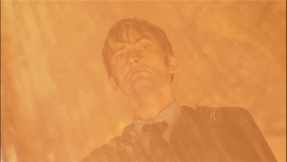
In this episode, the Doctor has just been separated from Rose, and he meets and saves Donna Noble from the Empress of the Racnoss. The Doctor discovers that the Empress is attempting to revive her species. Although the Doctor offers the Empress one last chance to take her and her offspring somewhere safe, she refuses. Therefore, the Doctor reveals her final decision is her own doing. The Doctor uses explosives to open the walls and floods the room, killing her offspring. As the Empress wails for the loss of her children, the Doctor looks on. The scene shows flames in the background and the Doctor from a low angle shot, presenting the Doctor as god-like and merciless, abusing his power. Watching all this, Donna begs the Doctor to stop and the two leave. With the Empress defeated, the Doctor offers Donna to travel with him, an offer which Donna declines. Before the Doctor leaves, Donna asks that the Doctor find someone because he needs someone to stop him.
For “The Hero as World Redeemer,” Campbell argues that “the hero of yesterday becomes the tyrant of tomorrow, unless he crucifies himself today” (303). Campbell differentiates between the tyrant and the redeemer. While a tyrant rules by ego, a redeemer “protects the unprepared” (303).
The savior figure who eliminates the tyrant father and then himself assumes the crown is (like Oedipus) stepping into his sire’s stead.
The above quote reveals an on-going cycle between tyrant and redeemer. In addition, the above quote suggests that a tyrant could have originated as a hero, but gradually became a tyrant. Furthermore, the quote implies that evil cannot exist without good. While the tyrant brings evil to society, the hero functions “as the carrier of the changing” (302). The Doctor faces numerous villains and saves many lives from the hands of evil. In “Doctor Dances,” the Doctor saves the day by preventing and curing an army of gas-masked virus carriers. As a result, “everybody lives.” The Doctor saves lives and planets, yet losing lives is often the cost. The idea of being a hero before becoming a villain relates to the episode “Journey’s End.”
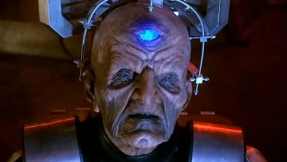
When the Doctor encounters Davros, an old enemy and the creator of the Daleks, he boasts that he has revealed the Doctor’s soul, “The man who abhors violence, never carrying a gun. But this is the truth, Doctor–you take ordinary people and you fashion them into weapons.” The Doctor remains silent because he knows that on some level Davros is right.
For “The Hero as Saint,” Campbell briefly states the definition. According to Campbell, the saint encounters a point of no return.
Endowed with a pure understanding, restraining the self with firmness, turning away from sound and other objects, and abandoning love and hatred; dwelling in solitude, eating but little, controlling the speech, body, and mind, ever engaged in meditation and concentration…
After the events of “The Waters of Mars,” the Doctor continues to travel in order to assuage his guilt and prevent his imminent death. The Doctor is no longer accompanied by his companions, preferring to travel alone.
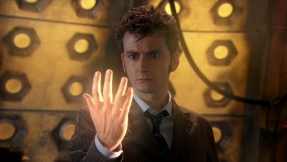
Lastly, Campbell defines “Departure of the Hero” as “the last act in the biography of the hero,” allowing his life to be epitomized (306). Prior to the Tenth Doctor’s regeneration, he revisits his past companions. One by one, each of his companions send their regards to their beloved Doctor. As a hero, his life represents the “dual perspective,” meaning after his death, he is still a “synthesizing image” (307). Campbell uses Charlemagne as an example to explain his idea: a hero will “sleep only and will arise in the hour of destiny, or he is among us under another form” (307). For the Tenth Doctor, he does die but rises in a different incarnation.
The Shadow
On the other side of the spectrum, the mind, according to Jung, has a personal subconscious, which is referred as the Shadow. This part of the personality is composed of repressed ideas, weaknesses, desires, and instincts. The Shadow relates to the “primitive, uncivilized, pre-evolutionary past of the species. Jung argued that the Shadow represents qualities that one does not acknowledge, yet one attempts to hide from others and one’s own self (Jung). Audiences see this archetype present in Doctor Who throughout certain episodes (“Dalek,” The Runaway Bride,” etc. ) but specifically in “The Waters of Mars.” Although the Doctor prefers a passive approach to solving problems, his involvement in the Time War remains a constant reminder of what the Doctor is truly capable of.
In “Dalek,” the Doctor and Rose receive a signal from Earth in the year 2012. They land in an underground bunker in Utah that features alien artifacts owned by Henry van Statten. Van Statten reveals that his collection contains one living specimen: a Dalek.
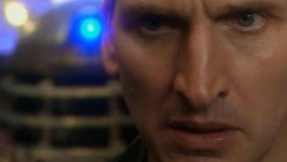
The Doctor is horrified to discover a surviving Dalek, a species of alien that was destroyed in the Time War. During a conversation with the Dalek, the Doctor tells the Dalek kill itself, saying “The Daleks have failed. Why don’t you finish the job and make the Daleks extinct, rid the universe of your filth–why don’t you just die?!” To which the Dalek replies, “You would make a good Dalek.” This scene reveals the anger, fear, and loathing of the Doctor. Towards the end of the episode, the Doctor is prepared to kill the Doctor in order to save Rose. When Rose sees the Doctor armed with an alien weapon, she begs the Doctor to spare the Dalek’s life, arguing that the Dalek is capable of change since it did not kill her or van Statten.
“The Waters of Mars” provides a logical progression to the Doctor’s character and further reflects the hero as a tyrant. Throughout the series, the Doctor makes a clear distinction between “fixed” moments in time and “fluxed” moments in time. The difference is the moments that are “fixed” cannot be altered. The episode begins with the Doctor landing on Mars in the year 2059 and encountering the first human colony. Captain Adelaide Brooke leads the members of Bowie Base One; however, the Doctor learns that this event ends tragically with the base being destroyed, leaving no survivors. Yet Captain Adelaide’s descendants, specifically her granddaughter, lead a successful mission, an event that is “fixed.” Therefore, the Doctor is aware that he cannot intervene. Towards the end of the episode, the Doctor risks breaking the laws of time. As he walks back to the TARDIS, the Doctor listens to the crew members dying.
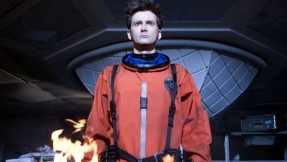
He’s tired of letting good people die, so he decides to return and save the members of Bowie Base One. He realizes since he’s the last of the Time Lords, so he possesses power: the rules of time belong to him and will obey him. Although the Doctor does his best to prevent the destruction of the Base, history, as Captain Adelaide points out, has other ideas: her death creates the future. Since the Doctor intervenes and changes history, there is no guarantee that the future, or timeline, will be the same. Because the Doctor decides to save Captain Adelaide and two other members of the Bowie Base One, he abuses his power. The Doctor behaviors arrogantly, and he realizes that he can do anything. As the Doctor prepares to leave, Captain Adelaide kills herself, an act which ensures that history remains unchanged. This episode remains essential to the plot because the Doctor’s actions reveal that the Doctor should not be alone and he needs someone to keep him grounded.
Why do people love Doctor Who? The list of reasons why goes on, but one thing for sure is that Russell T. Davies explored the Doctor’s humanism. Every hero embarks on a journey. By following the Doctor and his companions, viewers observe his many adventures, and through his adventures, the Doctor saves worlds, planets, and lives. His dedication to serve and protect others allows people to admire the hero’s qualities and inspire them to become a better person.
Works Cited
Campbell, Joseph. The Hero with a Thousand Faces. 3rd Novato: New World Library, 2008. Print.
Charles, Alex. “Three Characters in Search of an Archetype: Aspects of the Trickster and the Flaneur in the Characterization of Sherlock Holmes, Gregory House, and Doctor Who.” Journal of Popular Television. 1.1 (2013): 83-102. Web.
Jung, Carl. “The Archetypes and the Collective Unconscious.” The Collected Works of C.G. Jung. 4th Ed. Ed. Sir Herbert Read. New Jersey: Princeton University Press, 1975. Print.
What do you think? Leave a comment.










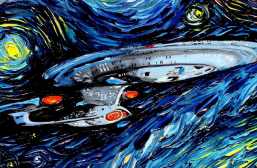
Nice overlook! Cannot wait for more new Doctor Who episodes….bring it on!
I love the way the BBC works. If this was a Hollywood production everyone after Matt Smith would get younger and handsomer until they were just a chromosome. A hot chromosome.
Matt Smith was anything but attractive. His face looks like Eric stoltz from the Mask.
Love Doctor Who. I’m way late to the party, just started last year. What’s cool is I don’t feel late to the party.
I was also late to the party but better late than never!
Given how this a show that has been going for just over fifty years, I think most fans are late to the party! ^_^
I just started watching this year and have already caught up with the current series and am working my way through the classic one. This is the first time I have ever gone through a show so fast, one season of anything usually takes me a month.
I was in the same situation a couple months back. The show is addicting. August is just a few weeks away!
Love this article and everything about The Doctor! After all of the years watching the show, my husband would always mock me for it. But just last month, I finally got him into it. He watched all of Matt Smith’s episodes in one week, haha. Now I can proudly share my love of the show with him!
Things I would like to see in the future:
1. The return of the Rani and her Time Capsule (she always had the best one)
2. Romana III
3. Less gimmicky aliens
4. The Black Guardian, preferably played by Ian McKellen
5. A good Dalek story, preferably written by Nicholas Briggs and featuring the Dalek Time Controller.
6. The return of Gallifrey (it’s ridiculous they’re still gone).
7. Him becoming Merlin
8. Susan (The way he left her previously was just cruel especially since she just lost her son)
9. The Mondas’ Cybermen
10. The Master back in his full glory
11. A non-terrain companion
12. A 12th/8th crossover
Well, we may see the return of Davros so I’m excited to see that. The return of The Master would be amazing!
More interesting story’s on other planets and time window’s and less down to earth running round london stories, seriously the bbc could afford to spend so extra cash on good sets for once.
GREAT ARTICLE, IM A HUGE DR.WHO FAN
Thank you!
I like Matt.
I preferred David ennant.
I’m glad their going back to an older doctor, the young dashing doctors were starting to get boring
Not just boring, but almost gimmicky sex appeal type thing. I got so sick of almost every female character being a bit in lust/love with the Doctor. I am looking forward to what Capaldi will bring.
I’ve used Joseph Campbell’s hero stuff in a lot of different papers for university, and you apply it to Doctor Who awesomely here. It’s great seeing different fields getting sewn together. Awesome article and thanks for writing it! The Doctor is such a versatile, interesting character~
I love Joseph Campbell and Doctor Who so this is two of my favorite things. 🙂 I like the way you applied the journey model to the different Doctors. Thanks!
With the twelfth doctor episodes about to start,it will be interesting to see if there signs of hero as tyrant right from the start.The way the teasers and the trailer for the upcoming season are going,they are hinting that the show will take a darker and more sinister turn with the doctor’s character
Yes! Steven Moffat claimed that the Twelfth Doctor will be darker, but I’m curious to know how dark without being reminded of the Tenth Doctor’s behavior towards the end of his run. Also, the return of Davros 🙂
Thank you for this article! The Waters of Mars was a great episode highlighting and the need for a companion. Very chilling episode. Hope this next season furthers the Doctor’s progression that I have not felt since the tenth doctor.
I always saw the Doctor as more of an antihero. He is dark and flawed. He may try to make the right decisions, but a lot of his decisions are selfishly motivated. He enjoys his flawed characteristics, admits them, and has no desire to change them.
I started to watch the new season with a new Doctor, and he and Clara really didn’t do much for me. I miss Matt Smith already as he was my favorite Doctor in the series.
Great work capturing how well Campbell’s theory applies to Doctor Who. The Doctor’s character development is especially fascinating, as are his personal relationships.
Excellent article. Without the potential and active role of Jung’s archetypes in Dr. Who I find it could not be as great (sorry, “fantastic”) as it is. I will keep this lecture as one of my Campbell analysis’ related ones. Thank you.
This world of Doctor Who is completely different from today.